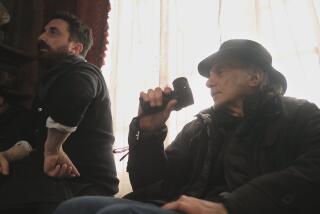Still having the last laugh
- Share via
Terry Gilliam, the maverick director responsible for such off-center films as “Time Bandits,” “12 Monkeys” and “Brazil,” met his match when he tackled Cervantes’ Don Quixote. His 10-year battle to bring the character to the screen became an obsession -- one he was forced to suspend when his $32-million production had the plug pulled by the insurance company in October 2000 after just six days of shooting.
Chronicling the film’s decline and fall were documentarians Keith Fulton and Louis Pepe, brought in to track the evolution of the project. What they capture in “Lost in La Mancha,” which opens here Friday, is part black comedy, part Greek tragedy -- with Gilliam unflinchingly keeping himself in the crosshairs of the lens.
Why did you invite the pair to document the making of “The Man Who Killed Don Quixote”? Shooting under a microscope is dicey at best. Wasn’t the camera an unwanted visitor when things began to sour?
Keith and Louis had done a film about the making of “12 Monkeys” when they were grad school film students at Temple University in Philadelphia. I wanted a record of the making of my Don Quixote movie and, when things went bad, had a morbid curiosity about what its death would look like in retrospect. The idea of a documentary is that you’re telling the truth, which is in such short supply these days. When things started crashing, I told them to keep recording because we were disappearing. No one has ever done a documentary about the “unmaking” of a film and, though I was miserable at times, I never turned off the mike.
The shoot was plagued with problems of almost biblical proportion -- a flash flood, wretched acoustics on the soundstage, noise from NATO fire-bombers, a lead actor hospitalized with a double herniated disc. Did you begin to feel like Job?
When the storm started beating on us, I couldn’t decide if I was King Lear or Job. I just knew that I was being punished. One of the key elements of the script is punishment -- for hubris, vanity -- and we got it by the bucket-load. It certainly was proof positive there is a God -- he just doesn’t like me. The experience made me very religious, or superstitious, at least. Orson Welles and Fred Schepisi both abandoned their attempt to shoot a Quixote movie -- and I’ve had four false starts. Maybe the project is jinxed.
Could you have done anything to avoid the debacle?
Going in, I was aware that our budget left no room for problems or mistakes, but my job is to maintain the illusion. Any filmmaker, any daring filmmaker, will tell you that making movies is always a nightmare -- very unlike the EPKs [Electronic Press Kits] in which everyone is smiling.
You’re trying to buy back the rights back from an insurance company that paid out what is said to be one of the most expensive claims ever for a European film.
The claim, I’ve heard, was for between $12 million and $15 million. It was the first time this company had been involved with a movie. They were also heavy into the World Trade Center, so these weren’t happy people.
You’ve said that you often reenact the movie you’re shooting. In this case, pursuing the impossible dream.
“Brazil” was a David and Goliath tale of one man versus the system -- and I went head-to-head with Universal over its release. [In “The Adventures of Baron Munchausen”] Munchausen was a grandiose liar -- and the film was labeled one of the most expensive failures of all time, a statement blown way out of proportion. Quixote is a man who’s crushed trying to make a banal world more interesting. I share his madness. And the “last hurrah” theme -- doing something extraordinary before you kick the bucket -- is even more powerful now that I’m 62. The grave is slowly pulling me to the ground.
-- Elaine Dutka
More to Read
Only good movies
Get the Indie Focus newsletter, Mark Olsen's weekly guide to the world of cinema.
You may occasionally receive promotional content from the Los Angeles Times.









